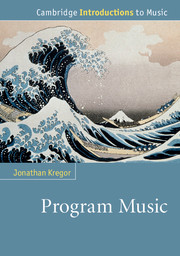Book contents
- Frontmatter
- Contents
- List of Figures
- List of Music examples
- List of Tables
- Acknowledgments
- Note on the text
- Introduction
- Chapter 1 Characters, topics, and the programmatic battlefield
- Chapter 2 Expression, musical painting, and the concert overture
- Chapter 3 Berlioz and Schumann on music and literature
- Chapter 4 Liszt and the symphonic poem
- Chapter 5 The New German School and beyond
- Chapter 6 Excursus: Faust
- Chapter 7 Programmatic paths around the fin de siècle: Mahler and Strauss
- Chapter 8 Programming the nation
- Chapter 9 “Ars Gallica”
- Notes
- Guide to further reading
- Index
Introduction
Published online by Cambridge University Press: 05 January 2015
- Frontmatter
- Contents
- List of Figures
- List of Music examples
- List of Tables
- Acknowledgments
- Note on the text
- Introduction
- Chapter 1 Characters, topics, and the programmatic battlefield
- Chapter 2 Expression, musical painting, and the concert overture
- Chapter 3 Berlioz and Schumann on music and literature
- Chapter 4 Liszt and the symphonic poem
- Chapter 5 The New German School and beyond
- Chapter 6 Excursus: Faust
- Chapter 7 Programmatic paths around the fin de siècle: Mahler and Strauss
- Chapter 8 Programming the nation
- Chapter 9 “Ars Gallica”
- Notes
- Guide to further reading
- Index
Summary
Music and meaning
In his autobiography, published in 1936, Igor Stravinsky asserted that
music, by its very nature, is essentially powerless to express anything at all, whether a feeling, an attitude of mind, a psychological mood, a phenomenon of nature, etc. … Expression has never been an inherent property of music. That is by no means the purpose of its existence. If, as is nearly always the case, music appears to express something, this is only an illusion and not a reality. It is simply an additional attribute which, by tacit and inveterate agreement, we have lent it, thrust upon it, as a label, a convention – in short, an aspect which, unconsciously or by force of habit, we have often come to confuse with its essential being.
This view of music – its nature, limits, and impact on the senses and intellect – was controversial, but not new. Twenty years earlier, author Jean Cocteau, composer Erik Satie, and impresario Sergei Diaghilev collaborated to produce the ballet Parade, a conscious experiment in non-expressive, non-meaning art. Sixty years before that, critic Eduard Hanslick professed that “the content of music are forms moving in sound.” And almost a half-century earlier, the writer E.T.A. Hoffmann voiced preference for instrumental music, “which scorns all aid, all admixture of other arts – and gives pure expression to its own peculiar artistic nature … [It] leaves behind all feelings circumscribed by intellect in order to embrace the inexpressible.”
- Type
- Chapter
- Information
- Program Music , pp. 1 - 6Publisher: Cambridge University PressPrint publication year: 2015



